

PORTRAIT face
PORTRAIT
cover design | Hannah Hu
collage | Portrait Executive Board
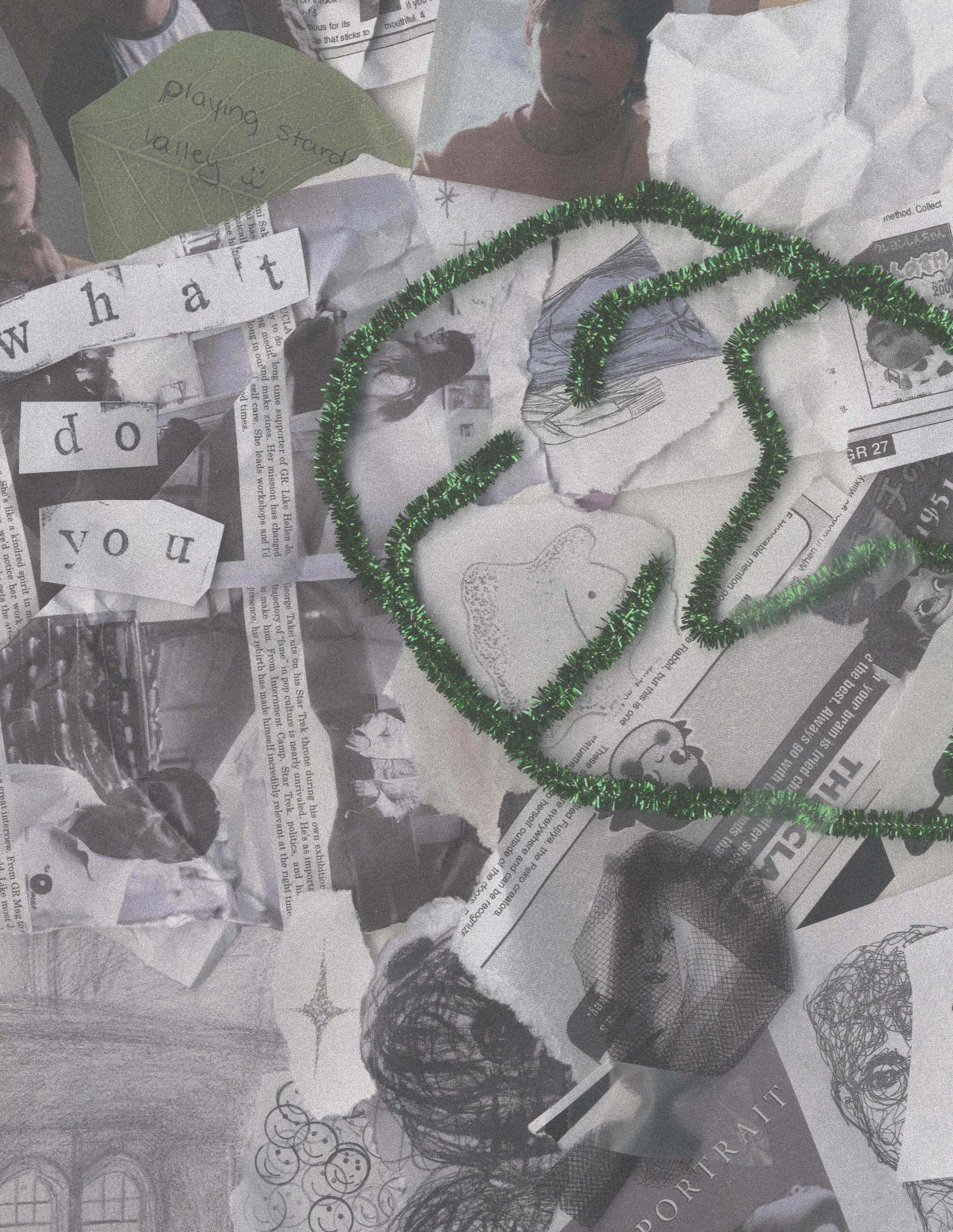

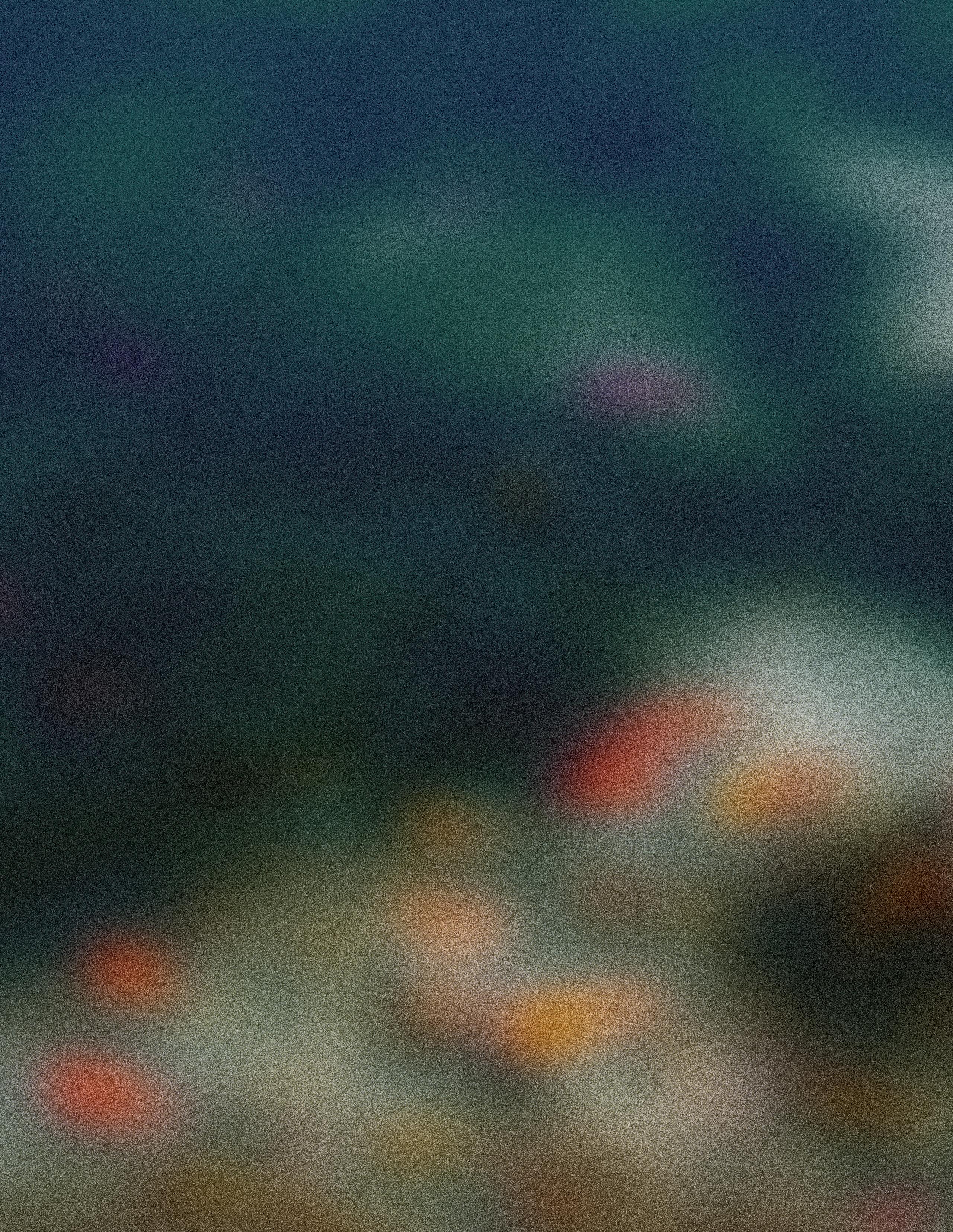


Letter from the Editor-in-Chief
Dear Reader,
Before I begin, I would like to thank you for reading this, and to thank all of our wonderful contributors for helping make this magazine possible. I joined Portrait my sophomore year, and it has been such a beautiful experience to witness its transformation over the years. We are an inspiring collective of writers, designers, editors, photographers, filmmakers, artists, at work together to create a collection that reflects us. I am so lucky, thankful, and proud to be a part of such a wonderful collective of artists!
This issue has been deeply emotional for me, and at times hard to work on. It is my last issue, and I had to face my goodbye to both Portrait and also Vassar. They have both been really important spaces for me to learn and grow. It has introduced me to so many amazing friends, peers, and fellow creatives that have taught me the beauty of creating, and creating in community. Portrait has allowed me the space to reflect on my identity, both as a transgender person and as an Asian American. My face has changed so much throughout my time here. I’ve done a lot of reflection on my face and my body through Portrait, but also how I connect with others and the world around me. It is a space to negotiate our relationships with each other, our identities, and our art.
The theme for this issue is face. This theme can represent so many things. Our faces are central to our identities, and our sense of selves. What does our face mean to us and our identities? How do our faces shape who we are? However, this theme also meant to prompt us. What are we facing? Can we confront what we face and how do we face them? This issue is not just a meditation on the literal face, but also a reflection on facing ourselves, each other, and the world.
With that, I present Portrait’s twelfth issue, face! Dive into the stories, get lost in the poetry, and admire the beautiful spreads our contributors have made. I hope this issue makes you reflect on yourself, your face, and what you face. Thank you so much for reading and helping make this issue happen. This is the face of Portrait.
Signed with love, Kiran Rudra


Akshaya
Anni Abigail
Ian
Nicole SJ
Mia Ziyao (Jasmine)
Katy Sogna
Nandini
Kiran

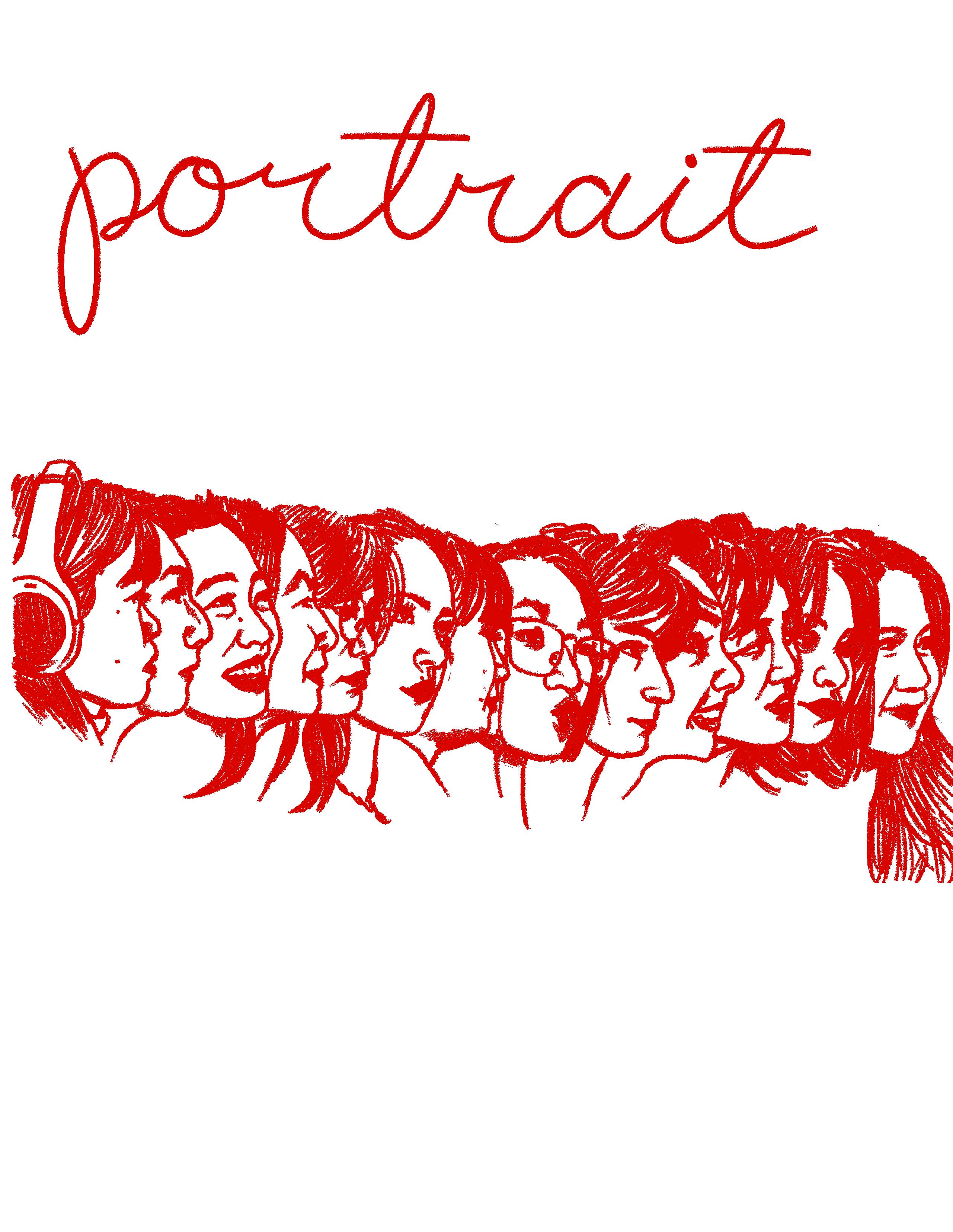
Ziyi
Ulysses Emily Samantha
Hannah Fallon
Jill Mingjia
Christian Ahona Sharon
Alicia Arlene

At the Bathhouse
Written and Designed by Mia LaBianca
Edited by Wenhui Lim
When I was a little kid, my biggest fear was getting lost.
I don’t know why this is. I’m sure I was scared of other things, but what I remember being afraid of from ages five to ten is getting lost. Being in an unfamiliar place, not knowing anyone—turning around and discovering that my mom and dad were gone, and I was alone. This was what I was afraid of. The fear did not come from experience. As far as I can remember, I never really got “lost”—I feared a backof-the-milk-carton, gone-forever kind of lost. The closest I got was the time I was in the supermarket with my father. My mind was wandering as my dad reviewed his grocery list when I suddenly caught sight of some sunflower seeds. I was in kindergarten at the time, and I remembered that in class we had been talking about these very seeds (we were doing a unit on plants). I stared at them, trying to dredge up all the facts I had learned. Then I turned to tell my father, and found an empty aisle. My dad was gone.
The supermarket faced me. Everything was suddenly unfamiliar and far too large. I recognized none of the faces that passed me by, and was frightened by their flat disinterest. The warm wooden ceilings and aisles of chips and dried goods were no longer friendly, but part of a larger system of people who didn’t know me and wouldn’t help me. I was alone. My skin went cold and my heart crept up my throat.
Then my father said, “Mia!” and I saw him, about ten feet away from me. He smiled bemusedly, with a look that said, Whatareyouwaitingaroundtherefor? The world seemed to right itself and the supermarket was once again familiar. I hurried over, feeling silly; my father was not so far away after all. But a ghost of the feeling remained. For a split second, I had felt smaller and more alone than I ever had. I tried to shake away the sensation, but I would soon feel it again.
I hated family reunions, and I couldn’t explain why. I only knew that the gray, low suburbs and the houses packed with people filled me with dread. My extended family were numerous and friendly, and somehow, I knew none of them. Their faces stayed forever unfamiliar, no matter how many visits we made.
The problem was that my parents would leave me. They would go off to speak to the adults while my sister and I unhappily clung to each other, forced to brave the carousel of unknown relatives. Every ten or so minutes, a adult would kneel down to speak to me, trapping me in a conversation and asking me questions I didn’t know how to answer. When they finally left, I’d slump against the wall and wish I was anywhere else. I felt they knew something about me that I did not; there was always a twinkle of laughter in their eyes, even when what I said wasn’t funny. My parents were no help; when I ran over to them, they’d laugh and stroke my hair before going back to talking to the grown-ups. Then I was alone again; then I was lost. Spirited Away captured that feeling in a bottle.

Spirited Away is about a ten-year-old girl named Chihiro who becomes lost in the spirit world with her family. When the family first comes across the spirit world, Chihiro’s parents are unaware of any danger; but Chihiro knows, and the audience knows, that something is wrong with the abandoned town they’ve come across. Chihiro, alone, quietly wanders through the town until she comes across a grand, tall bathhouse. She stares at it, a bit of wonder in her eyes. “It’s a bathhouse,” she says, to the wind and the bridge. From this moment on, she is lost.
When Chihiro returns to her parents, she discovers that they have been turned into pigs. With the help of a boy named Haku, who somehow already knows her name, as well as a young woman named Lin, the six-armed boilerman Kamaji, and a silent spirit named No-Face, she makes her way through the bathhouse and eventually negotiates with the proprietor of the bathhouse, Yubaba. She is able to get a job at the bathhouse, and hopes to eventually save her parents. But the world around her is strange and dreamlike, inhabited by spirits and governed by unfamiliar rules. The people are often monstrous, and even the humanlike figures reveal inhuman tendencies, such as eating roasted newt. In this alien world Chihiro finds herself in, she remains dogged in her mission and kind to those she meets—but she is also terrified.
I knew Chihiro well. I knew her fear when her parents turned around and revealed their piggish, empty eyes. I knew the mounting panic of running and finding everything to be completely unfamiliar. I knew the feeling of deciding to trust a stranger, as terrifying as they were, because you didn’t know if you could do it alone. It didn’t help that Chihiro and I looked a lot like each other as kids—skinny toothpick bodies and faces plump with baby fat. I even pulled my hair up like her. She wasn’t me, and she wasn’t my friend, but she was something in between. Her fear was my fear, but safer; more distant and more beautiful.
That was one thing about it—as frightened as I was for Chihiro, I had to appreciate how lovely everything was. It was a beautiful dreamworld, and even the terrifying parts were pretty, which somehow made it all the more unsettling. But what really struck me was the kindness of the people she met. They weren’t friendly by any stretch of the imagination. But Kamaji, Lin, and especially Haku, all helped her as much as they possibly could. Each one of them so terrified me when I first encountered them, and each one revealed to me throughout the course of the movie that they loved Chihiro.

As I got older, I got afraid of new things: making friends, or my friends secretly pitying me, or sitting alone in the cafeteria. The world seemed filled with unfamiliar faces, and I was afraid, more than anything, that no one would like me. But in Spirited Away, the faces of the characters change. They become friends, lovers, and family; their faces, once antagonistic, peel open to reveal bone-deep love. Towards the end of the movie, Yubaba puts one final test to Chihiro: pick out her parents from a group of identical-looking pigs. The entire bathhouse watches her anxiously—the audience realizes that they want her to win, and aren’t rooting for Yubaba at all. Chihiro examines the pigs, looking confused. None of them are her parents, she says. With this, the pigs transform into spirits from the bathhouse and cheer, “You did it!” A whole house of people, rooting for her—once strangers, now friends. This is not my favorite moment in the movie, though. My favorite moment from Spirited Away is likely everyone’s favorite. Chihiro is riding on Haku back to the bathhouse. She’s quiet. Memories from her early childhood flash before us—her in the water. Silky teal dragon hair. A little pink shoe. “I fell in,” says Chihiro. “I thought I’d drown, but the water carried me to shore.” Haku’s face, bristling with snow-white fur. “The river’s name was the Kohaku River. I think that was you, and your real name is the Kohaku River.” And Haku’s draconic form bursts into shards of glass, revealing his face once more. I want to grab this moment and hold it tight to my chest. Chihiro is unfailingly brave, and I know she is brave because I know she is terrified. Chihiro is ten; she is without her parents and scared out of her mind, and despite that she tries her best and treats people kindly. Chihiro is able to see past Haku’s unfamiliar face into the person that he really is—the person she knew all along. Her willingness to understand people, despite her fear, rewards her with a love she didn’t know she was missing. Chihiro was brave in the way that I found it hardest to be, and I loved her because I knew she found it hard, too. I knew, because of her, that the things that scared me the most could become dearest to me. So the fear was alright—I knew that I could face it, no matter how hard it might be. There was something precious waiting on the other side.
Jadon-Sean Sobejana
Edited by Ulysses Bergel
Designed by Jill Wong

Philippines. I will never understand how your life is lived, and how hard your people work. I will never understand your students’ dedication to making you better for the future, or how you’re up before daybreak for the hope that your loved ones may have something to eat in the morning. You were the first to teach me to look beyond physical nature, and reach deeper inside to see the resilience, love, and determination spanning across all of your corners. And even though I will never understand, I will never forget how— through it all — your radiant smile is the one that pierces through all tribulations.
You began to show me what the word beautiful meant when you asked me to hold your hand to help you walk because your knees were hurting and they weren’t what they used to be. Though, you would never tell me that. Instead, you would just keep smiling at me because, well, that’s just who you were. You also loved to dress up and tried to look so beautiful by putting on makeup, red lipstick, and your favorite fashionable halter, even if we were just going out to eat at Goldilocks. You succeeded everytime, don’t worry. You just didn’t need it. Most of the times, I hated eating out. But that’s only because I wanted to eat delicious home cooked karekare, that only you made the best, with you.
What I started to see as beautiful wasn’t anything that I was directly looking at. I saw it when you clapped your hands in glee to the rhythm of George Baker Selection, shuffling your feet back and forth like you were nineteen again. I saw it when you were in joyous disbelief that your loved ones surprised you by visiting you in the Philippines. And I saw it when you constantly told me, dapat laging masaya (you should always be happy). I didn’t know the substance beauty had until you showed me that finding it in simple moments was more worthwhile than admiring what’s on the surface. Instead of being mesmerized by a field of delicate pink daisies, you should try to close your eyes and smell the alluring scents that the wind carries with them.
I’m sure that if I was able to hold your hand one last time and look at your beloved face as you peacefully and eternally slept, I would see and know that the moments you left behind are always beautiful.

Uncanny Appeal
Written by Ulysses Bergel | Edited by Ian Watanabe | Designed by Mingjia Ni
I finally close my door and am sealed away from it all. Without any observers, I can finally start my work. My fingers reach for the edges of the mask that I wear, the one I gambol and dance and perform with, and it comes away. The empty expanse below it, bereft a face is finally revealed, and I’m allowed to relax. I can finally be myself, as cold and elegant in my anonymity as a mannequin. I can stop being a who and slip into the beauty of being unknown.
In those precious moments of strangeness and anonymity, I don’t have to perform anymore. I’m able to just be me. Out there? The audience expects a good performance, and the critics have sharpened their skewers. So,my act is the best I can muster, day after day.
It wasn’t until about last year that I started to ask why things are the way they are. Why? Seriously. Why do I feel the urge to perform and smile and laugh with a face that is not my face? Why do I need to carve away at the things that make up the who of who I am for the sake of meeting expectations? Why do I so desperately want to be liked? Why do I need it so much?
It struggles and it hurts to have that dissonance hanging in the air. I spent so much of my life exchanging one, fixed mask that was not my face for another. I was playing a role built on appealing to everyone around me. Somehow, being known is so much more painful than being anonymous. Being known means that there are expectations to uphold and face to save.
So, I’ve decided to untether myself from my face. My face is not my face is not my face, and I will become a shapeshifter instead. There’s no me to give away anymore. I get to subvert the expectations that I sacrificed myself for in the past. It’s downright uncanny how similar things are. The difference is that I do things on my own terms now.

If I’m called on to smile and laugh with a face that is not my own, then I’ll slide my own meaning between the lines. With every little subversion, slight, and spin, I will exhume the identity that I have buried and give it the touch of cold, anonymous elegance. Through this dark alchemy of identity and spirit, I will reclaim the face I have lost.
The expectations are still here, the ones I’ve played to for years. From friends. Family. Myself. And, that mask is still there. It beams at me, and it hurts to look at it. It would be so easy to go back. To live to please again, to wear a mask that is not my face. But, I can’t.
It’s time for my face, the one I choose, to be my face.




punching bag

I still brace every time I see the damn car when I’m driving alone. On our long family road trips, my brother and I used to play the punch buggy game—it was a slap every time you spotted a yellow car, a punch for the Volkswagen Beetle, and the dreaded combo for the ever-elusive yellow punch buggy. I would try to dodge the punch, but it didn’t matter; he always had the faster reflexes and the harder punches. You could say we were inseparable in our play.
But it wasn’t really ours. Rather, I was the subject of his play.
Since my earliest memories, I craved his attention like no other. At the dinner table, he’d take my arm and twist it with both hands under the table, twisting it as hard as he could until my arms flushed rosy red. I tried to do it to him after, but I wasn’t strong enough. In the winter, after we had plowed the driveway he’d pelt me with icy snowballs off the sidewalk. Mine, on the other hand, crumbled before they even left my hands.
At the end of the day, I’d run to my mother. One day she stopped taking my side, and it hurt more than any pinch, any slap, any punch I had ever gotten. She told me to stop provoking him. I should have realized that she once experienced it all, too.
She was so, so tired of being the punching bag.
Growing up, I was always told that my brother and I looked the same: that if he took off his glasses, and if I pulled my hair back, you couldn’t tell us apart, but somehow I couldn’t see us as more different. One day he left home to go to school across the country and seemingly didn’t need me anymore. With so much distance and time, all I can think about is his last memories of me, and my last memories of him.
They say your siblings are the only people who truly know what growing up in your specific environment is like. Maybe that was why it felt like such a betrayal. For the longest time, I couldn’t understand how you could go from being that close to nothing at all. A lifetime of shared experiences connects us, yet with our dwindling telepathic connection it bears no sustenance.
I’m no longer his punching bag, but I haven’t forgotten. I kept getting told as a child that once we grew up, we would stop fighting. I looked forward to the day when we’d put our differences aside and finally be a team like my mother and uncle are.
But then I look at the two of them now, without my idealistic childhood tinted glasses, and I finally see the decades of hurt and loneliness in their hearts. They don’t talk about the things he did to her when they were kids. From an outsider’s perspective, it’s flawless: a carefully constructed illusion of happiness and strength, for the sake of their children, that both inspires and scares me like nothing else in this world.
It scares me just how broken my brother and I may have been all this time, but I don’t know how to break that silence. I wonder if he feels it too when he can’t sleep at night or when he feels like he has nowhere to displace his frustration. I send him pictures of our cat to tease a response out of him—the one thing it feels like we still have in common—but it’s not the same.
I see her now, a girl who just recently lost her own mother, and my heart breaks for her–how alone she feels taking on the mental load of the world solely on her shoulders. She feels so foolish for loving so much and receiving so little in return.
It has taken me too long to forgive her, to realize that we are the same. Even if there are times I might dislike him, I’ll always care; the connection is still there, somewhere. I’ll keep coming back, and I’ll keep trying, even if the punches hurt. Maybe I do care too much. Because the truth is, I still brace every time I see the damn car when I’m driving alone, but maybe for different reasons than before.
I’m no longer his punching bag, But I almost wish I was.

Writer: Abigail Wang | Editor: Peili Heitzman | Designer: Anni Yu

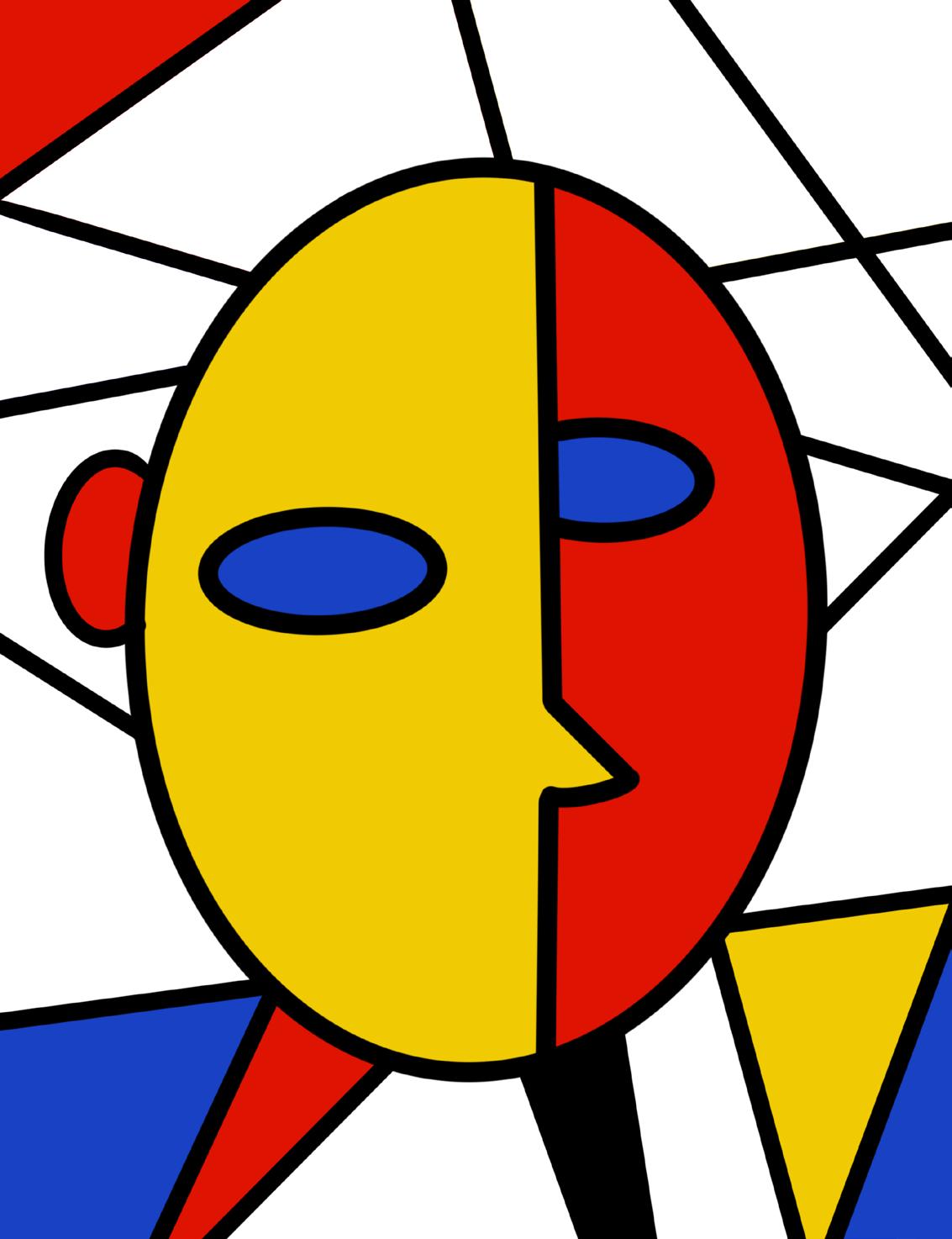
Exploring artistic expressions of
FACES










on this rock

i want to tEll you slowly of thE story whErE thE soil and blocks and tirEd clock of housEs and grass didn’t gEt in thE way of two bodiEs that Just want to body.
as if tHEy’rE ands mEant to bE on aRms that must HavE shouldErs, pavEd roads witH guilty whispErs stEpping asidE bEcausE of coURsE, my bad. bEcausE thEy know of thE onE thing bEcausE wE ’rE all mEant for it.
spacE has a way of dancing likE thE mothEr tonguE, familiarity twisting forEign longing, storytElling with a hurting CHEst from a missing backbonE–so i’ll tEll you silEntly, from a distancE
writtEn
by
sJ JEong
EditEd
by
pEili HEitzman
dEsignEd by Miranda
liu

FIRST OF MANY WRITTEN AND DESIGNED BY FALLON DERN
In my heart of hearts, I know it’s a coincidence. I am a spirit and soul and a mosaic of those I’ve loved before. They are no different. We share nothing but you, for a moment, and our race, for a long, long while.
Nonetheless, I lay alone without a body that looks like yours and call into question my past, your intentions and my sisters and brothers turned successors and lovers. It was chance that we found each other, it was coincidence you then found another with my background. The pattern is in the frequency at which I face this cycle.
In the fall, I circle the same blocks over and over just to hear the bridge of that song I listen to alone because you like music in languages you can read. The leaves crush themselves into a palatable nothing beneath my tires, caking themselves into grooves until they make no sound at all. Only then do I pull into your driveway. I turn on The Smiths.
We find mutual friends in the older kids who tell me you’re doing well. You saw Vietnam and Singapore over the Winter break. You’re flushed in their photos, Tiger Beer sloshing out of cups you clash against hands as pink as yours. How often did you think of me, then?
In the spring, I get a call from your mom. She’s still a family friend, and I use her maiden name to forget who she birthed. You’re playing soccer and studying
hard. I ignore the rest. I’ll always be the favorite girlfriend, she tells me. Helen, the violinist who keeps you hidden from her parents, will never measure up.
By summer, I forget about the girl who shared my Korean name and the bed you unmade for me. Your skin touches as you sleep, an intimacy I never risked. We would only embrace when gauze wrapped my chest. You would insist upon treating me, if it made you feel better, but you are no doctor and I am no fool. I haven’t any flesh to grab or kiss or touch. There’s only gold star stickers and text that reads, “Best First Girlfriend,” like it’s an achievement to have found untouched men. Then, a banner, stitched to my skin beneath my bra. Inscribed: “Asian Girlfriend. First Of Many.”
I lay alone without a body that looks like yours and run my fingers along each scar. It’s an innocent, recurring coincidence, I imagine. I just wish I never knew about it.
I like to believe I was loved deeper than an idea, a novelty or an, “I’ll never know your experience.” I was meant to hold that love tight to my chest and yet I am left with my arms outstretched. One hand haphazardly pieces together the hinges to a door I wish you never opened. The other clutches your fine china, who hears about me kindly. Every anecdote is cherished and my name is never soiled; I become a cultural Rosetta stone. You become the Prometheus of useless Asian trivia. I let you light fire
in the finger hearts of girls who cover their mouths as they giggle, kindled by the chopsticks I taught you to use.
Still, I love you enough to never meet the new girls. I assume you show them photos, for context. You’ll never admit anything to yourself, but you pick the photos where my hair is light and I stand in leggings. I am White from the shoulders up, and my mouth shut. My body, though, is a temple of a religion you can’t pronounce and clothes you can’t take off. It’s a fear I blame on my mother when I know it’s of you.
You are the athlete, the writer, the boy from the summer and the girl from the fall. You are the one whose new girlfriend called me with her deeply uncomfortable revelation. You are each and every Asian who has placed my Whiteness on a pedestal, and the ones who know I am the closest thing to foreign they’d let themselves touch. You are both the White men who make me watch their anime, and the ones who promise to be “one of the good ones.”
As I lay alone without a body that looks like yours, I am reminded that you need not come back to me.
I will find a new you and I will find their old lovers.
A sickening relief will flood me then, as it always does.
They don’t look like me yet.
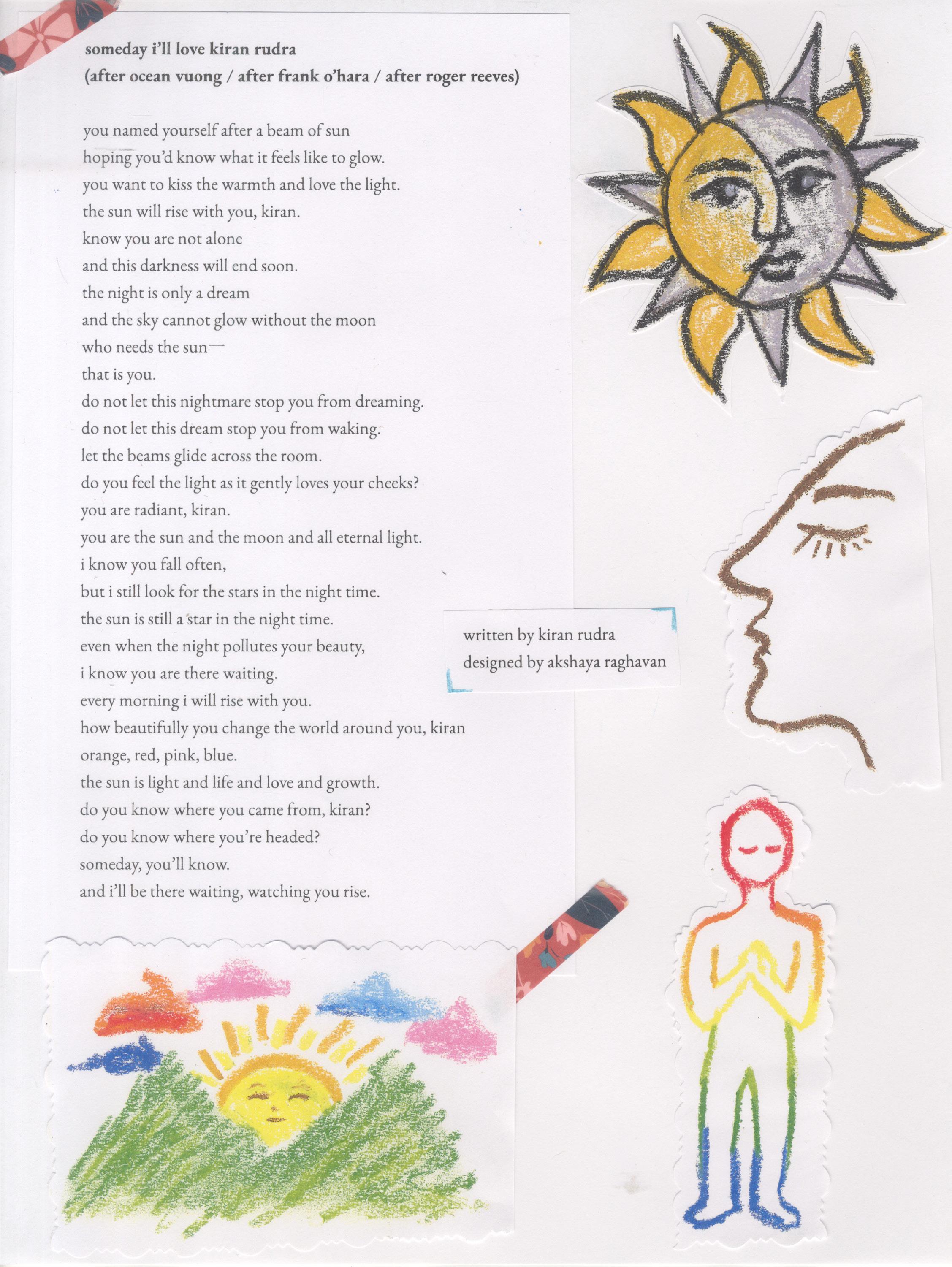


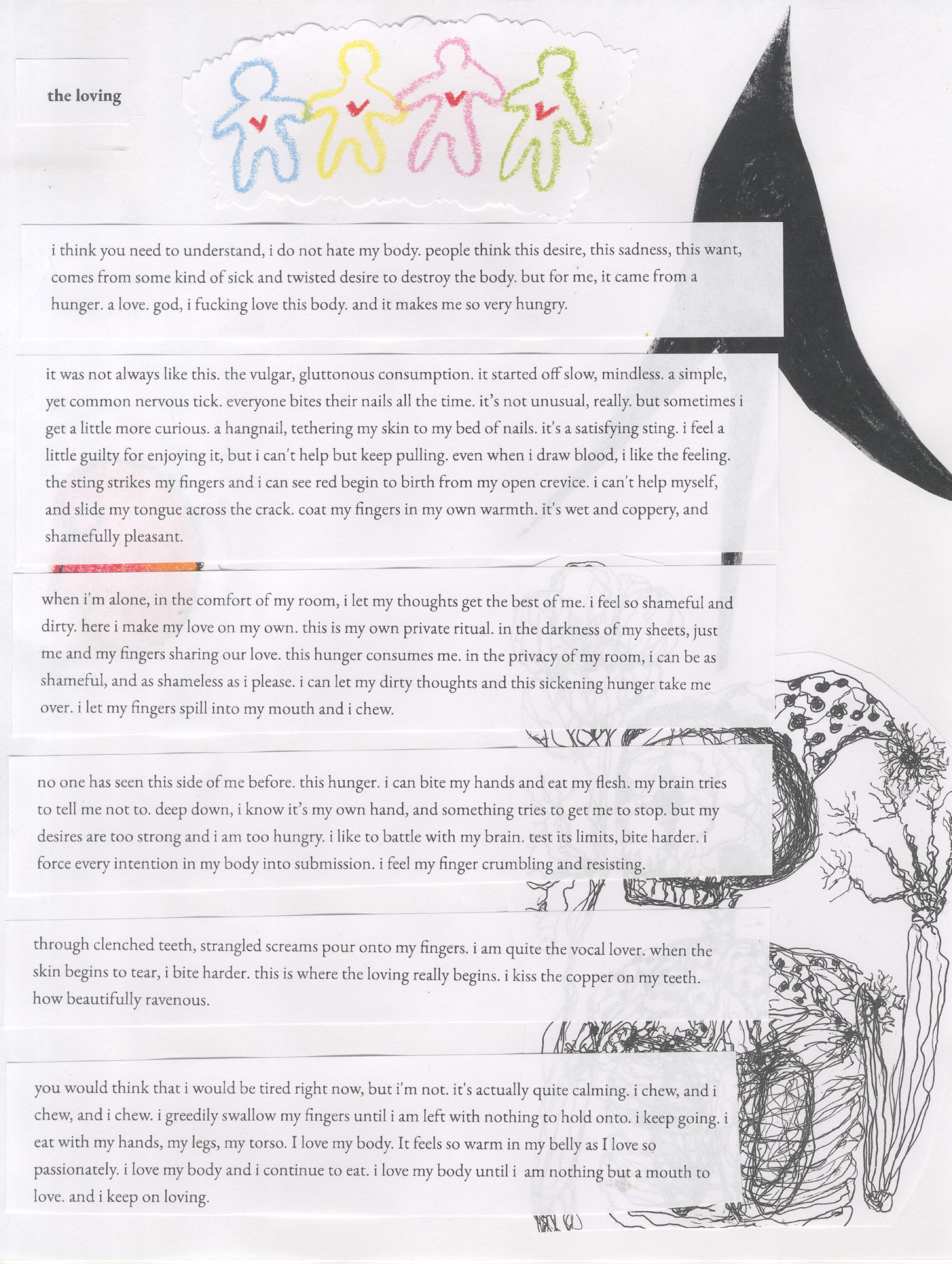
in august, the main feeling you had was anticipation. you could not wait to go to college. the day before you left, your partner visited you at your job and you got matching bracelets together. it was a beautiful moment and you knew that he would miss you, especially because you would start to do long distance. you entered college for the first time and met some wonderful friends. transitions and orientation weeks were filled with joy and laughter, and you excitedly updated your partner on the day’s events over call. you felt so elated from this new shift to college, and when classes started, you were beaming.
in september, everything was working out great. your partner came to vassar, and for the first time in your relationship, he stayed the night. you loved the dynamic that you had with him, and you continued to keep up a healthy relationship. as september continued, you began to meet new people, all types of friends. college was going great. this happiness all lasted until the last week of september, when you met someone who played a huge role in the cracking of your relationship. you and the person you met were platonic, but you found him slightly attractive. you got drunk one night at a party and put your arm around him to stabilize yourself, and you and a group of friends ended up in his dorm room. nothing happened, but the situation was profound enough to make you have a mental breakdown the next day. you were also feeling the strain of midterms, and particularly computer science after you didn’t do so well on your first quiz. all these events and turmoil continued.
in october, you had the worst week of your life in college. you began thinking irrationally and started doing things you regret. you were scared of your attraction to another person and started to question your relationship. you knew you didn’t want to end it with your partner, but you also didn’t know how to feel about the future. you wondered if you did end it with your partner, would you find someone else? you were overthinking. on your and your partner’s first anniversary, you called him exactly at midnight because you were studying before. you tried to smile and be so excited for your anniversary, but he didn’t know the pain you held inside. you felt guilty. you felt stressed. you felt anxious. you loved him, but you felt so many other emotions at once. as you finished taking your computer science midterm, your partner arrived. he looked so excited to stay with you. yet, at night you broke the news that you wanted to break up. you were running from your emotions. the ultimately selfish desire was to guard your heart, and you ended up hurting the one person you loved most. when he laid in your arms crying, you wish you could’ve turned back time and never said anything. you wanted him with you. you had someone who felt like home to you. throughout that weekend, you loved him and you cried so hard, wishing that you’d never said anything. when he left, everything felt different. although you agreed to end it on a note of positivity, and that you two could still stay in touch, you disrespected him. you were so empty that you didn’t listen to his pleas of “don’t drink” or “start therapy” and you kept wanting to run from everything.
after a few weeks of imbalance, in november, you finally began healthier habits of working out and going to therapy. you tried to maintain the current relationship you had with your ex, and you tried to talk to him and share more about your day. however, at one point, it started to feel like you were just replying to him instead of actively texting him. you wanted to text him, but everything was once again hitting you at once.
in december, you solidified your college friend group. you started hanging out with more people, feeling a bit happier than you felt in months. however, the toll that you were just replying to your ex caught up with you, and you felt so suffocated. he let you know how he felt one day, and you spent a while thinking. you still loved your ex. you knew you didn’t want to keep hurting him any further. however, you couldn’t give the one person you trusted with your whole heart attention, and you knew that by staying in contact with him, you’d hurt him more. you told your ex that you two should go no contact. after that, you didn’t feel like yourself. you isolated many people around you and had many random outbursts and mood swings. you felt like a shell of yourself. yet, you would look at what he’s doing and ask your friends about him. you knew that even if you couldn’t support him directly, you’ll always be cheering for him on the sidelines. your grades were also going downhill, and you had minimal motivation to try during finals week. you felt like a failure. when winter break started, everything affected you even more. being back home was triggering, as you felt like you had no friends and no one you trusted. you felt undeserving of everything, as when you had people you loved, you hurt them.
you’re slowly piecing back parts of your old life, yet you still feel like a shell. you feel constantly guilty about everything and want to make things right and finally tell the truth. you believe that you’re toxic and undeserving of love. yet, you want to tell the truth about everything. you’ve cried so many times and felt so low this month. you slept way too much and didn’t get up. your thoughts about your ex are consuming you. what do you do now?

december 31, 2023 10:50 pm
it’s been a few months since you wrote that letter to yourself. so much has changed in a few months, and honestly, you are accepting the changes.

january started with closure from your ex, as you had a six-hour conversation over text. you were finally able to tell him the truth about everything. you were inconsolable and crying the whole night, but you woke up the next morning feeling satisfied with the conversation. besides telling the truth about everything that happened, you were also able to update him about new events in your life, and the final update helped you move on. you knew that you couldn’t start 2024 by continuing to hurt yourself with all these negative thoughts about your ex and your insecurities. you knew that if you wanted to move on, the first step was to acknowledge your mistakes and then try to move on. constantly thinking about your ex and letting the thinking affect your mood wasn’t healthy.
as a result, you sought out more therapy from metcalf and you engaged in healthy habits. you went to the gym regularly, slept well, and ate well. you journaled and acknowledged your mistakes from your previous relationship. you were self-aware about your insecurities and took measures to either accept or combat them. by taking on project 50, you had actual motivation to accomplish your daily goals. you invested in daily reading and tried new hobbies, such as pilates. you surrounded yourself with people that you knew who cared about you. you started to see someone new. for the first time in a few months, you felt content with your current lifestyle. now in the middle of february, you realize that you’ve learned so much in such a short time.
everything is temporary. life is short and moves very fast. you need to enjoy the moments while they last while acknowledging that these moments are temporary. eventually, all the negative experiences will fade, and you will see better days. as you continue to work on yourself, you will grow to become a better person. you will impact the lives of others around you in positive ways, and you will be proud of the person you have become.
despite everything you face, keep on moving forward.

february 17, 2024 9:10 pm
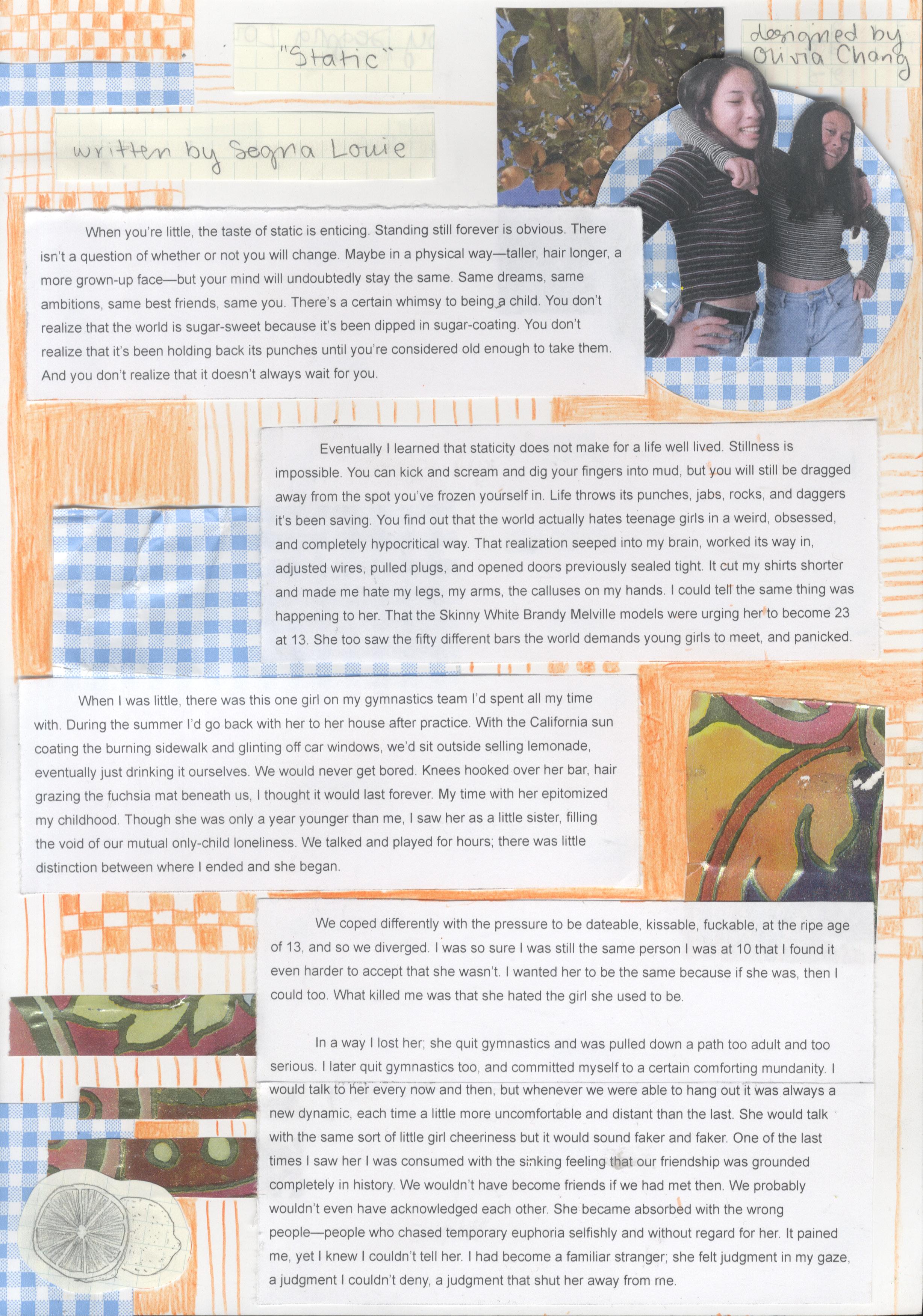




My endless love
My grandmother and I walked hand in hand inside her old house, almost inspecting it, looking for any mistakes in how the new inhabitants had designed the interior. Slowly, step by step, we walked through the living room, to her old bedroom, the dining area, my grandfather’s room where she took care of him when he was bedridden, and even the bathroom.
“This tiling doesn’t look that great, don’t you think?” she whispered to me, pointing at the tiled trim on the entranceway of the bathroom.
I thought the same thing but didn’t dare say it out loud. I looked at her, smiling and nodding in mischievous agreement. It was her house after all. Built from the ground up, every architectural choice was made by my grandfather’s and grandmother’s creativity. Even though the house was eventually sold because of my grandmother’s old age, the memories embedded into the walls transcend further than any structural change in tiling or interior design.
Sometimes when I can’t sleep, I think about my grandmother’s house and her presence in each room. The words she said, the sound of her voice, and her face with a loving smile were always invitations to play or converse. I remember, when I was younger, the mole on the upper right of my grandmother’s nose always stood out to me. It was unique and caught my eye. My sister has my grandmother’s nose — wide and prominent. My sister doesn’t like her nose, but
Written and Designed by: Ahona Dam
Edited by: Kiran Rudra
I remind her that it’s our grandmother’s, a maternal stamp from our mother’s side. My grandmother’s nose was beautifully curved and perfectly paralleled her lips which stretched wide when she would smile or laugh. Her skin was so soft and her wrinkles rippled like sand dunes. Every afternoon when I would nap between my grandmother and mother, I would face my grandmother and notice her wrinkles, sometimes dragging her matrimonial bangles across her arm, noticing how they would get caught in the folds of her skin.
My grandmother was the most special person. I don’t think I can describe her simply using adjectives but there’s a beauty in just memories. In 2020, my mental health was not great and my mom told my grandmother that I was feeling down almost every day.
“You can always talk to me. Anytime when you feel upset, you can call me and talk to me about anything,” she told me 8000 miles away.
This was my grandmother. Bela Talukdar. A piece of my heart, a teacher, a storyteller, someone who had lived a thousand past lives, my blood. April 17th, 2022 my body had weirdly woken up earlier than usual. I could hear my dad downstairs talking in a muffled voice. Something happened to someone. A distant relative, I thought. I went down

stairs, and so did my mom. My sister came down shortly after.
“Who? What? Who?” my mom kept frantically asking my dad on the verge of tears.
My dad wanted my mom to calm down and told her to sit down. It was the first time, in my life, that I heard my dad’s voice crack. My grandmother had suffered a hemorrhagic stroke. My mom’s wail was her heart screaming across the ocean for her mother. My mom planned a trip to Kolkata in June to see my grandmother after 3 years, and now she was changing her flight to leave early that night to perform the last rituals.
I was so naive. I thought that a miracle would save my grandmother. It was laughable but still, a part of me believed that I would be able to see my grandmother again, talking, laughing, and playing Parcheesi with me. We got the call that night that my grandmother had passed away. My mom was on the plane, and she would know the news when she landed in Kolkata.
Why this news was even more shocking for me was that the day before, I had spoken to my grandmother. It was Bengali New Year and I had asked for her blessings for the new year. We all talked to her. When it was my turn to ask for her blessings, it felt different. Not in a bad way, instead it was beautiful and touching.
“Amar shubho bijoyar pronam niyo. Accept my respect and prayers for the new year,” I told her through my mom’s phone.
“Amar onek, onek, onek, onek bhalobhasa niyo. Accept my endless love,” she repeated telling me how much of her love she was giving me for the new year.
How could I have lost someone who I had just talked to the day before? I’ve read stories and shocking events like this before but never imagined that I would be living it. My grandmother was my everything and now she was no longer someone I could talk to, ask questions regarding my mom as a kid, or laugh with.
I don’t think I have ever cried the way that I did when I lost my grandmother. I felt the pit of my stomach become knotted and a release of a single sigh would send tears rushing down my face. At night, in the shower, and while I ate and spoke about her I could feel the pit unravel. There isn’t a single
day, even now, that passes without me thinking about my grandmother. It was so difficult for me to understand that someone with no chronic health conditions, someone who had spoken to me less than 24 hours ago could suddenly be taken by God. That’s how I imagined it. God had taken her away from me and my family and my grandmother had done nothing to deserve it. I was angry by the sheer audacity and power that God had to take her away in this perfect state of mind. My faith in religion started to crumble and I was now uncertain in my beliefs. I felt somewhat selfish in thinking that I should have had more time with my grandmother. But that’s what I wanted. I wanted her to live longer and pass away when the time was right, but the time didn’t feel right.
From time to time, I look through all the photos of my grandmother on my phone, and unique memories piece together in my mind like a mosaic. I’m scared of losing the sound of her voice, the feeling of her sari, the taste of her food, and the smell of her home. I long to go back to her house in Kolkata and have the chance to spend one last day with her. Nothing special, just the usual routine and banter.
I will grudgingly make my way to the table for lunch as I see that we have fish again, but smile at the aam chutney, mango chutney, as a side. I will swing on the dolna, and call my grandmother to the veranda if a vendor asks if anyone is home because she is the head of the house. I will eat the sour mushumbi, sweet lime, and give a plate to my grandmother as we watch our current favorite Bengali serial. I will pester my mom to take me somewhere. Anywhere. But I will want to go in a rickshaw. For dinner, I will smear Kissan mixed fruit jam on my roti and watch the singing competition on Zee Bangla. My grandmother will join and at around 10:30 she will start snoring. We will go to bed listening to the barks of stray dogs and mutters of people across the field. Just one more day.
I’m grateful and so lucky to have known a person as kind-hearted, loving, and wise as my grandmother. She was my direct tie to Kolkata and the person I would go to for a laugh, advice, or funny stories. If I could spend just one more day with her I would tell her: Tumi o amar onek onek onek onek bhalobhasha niyo. Accept my endless love.




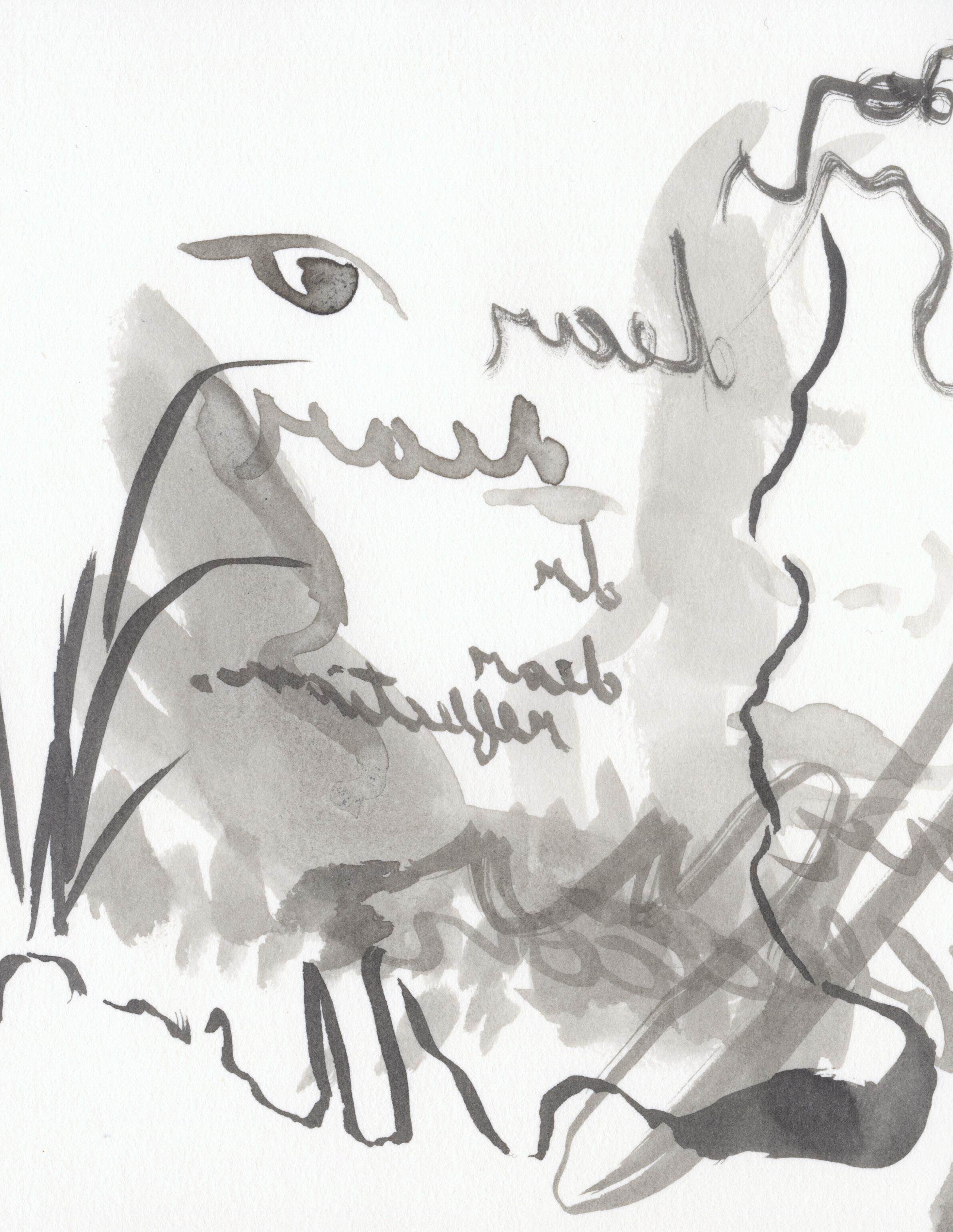
dear reflection,
dear reflection, love, emily
dear reflection, I want to be seen for more than my face
How about my strong calves? How about my goofy, giggly demeanor? How about my curiosity? And every “I have a question!” Along grey sidewalks and curvy dirt roads I wish those casually strewn words “Ching-chong!” “hay una chinita! mira!” “Ni-hao!” wouldn’t feel sogut-wrenching, confusing, and belittling I want to be seen and to be looked at with inquisitive eyes, for more than my face
But, then again when she traces her fingertips along my peach fuzz-covered skin, besides my thoughtlessly groomed eyebrows, and almost grazing my soft, pink lips when she stares into my dark brown eyes and when that young girl said the color of my hair was “café!”
And when I saw Gemma Chan adorned with glittering jewels I felt as if I could finally be beautiful. Not tokenized.
Oriental
Exotic
“Do you watch anime?”
I don’t want to be anyone’s fantasy I want to be me to make others smile and to make any version of my younger self
(hopefully) feel less alone. Maybe when they layered black eyeliner over and over again on my smooth monolids
They didn’t know how to see anyone else but Reflections of themselves How else do we exist? amongst differences?

dear reflection, Maybe one day, they’ll see me when their skin wrinkles and I still get carded at the grocery store Maybe I’ll no longer wish I could be normal treated like
“everyone else!” and I’ll finally tell the 13-year-old girl crying in the dressing room That we wouldn’t have wished for our skin, our hair, and our eyes to look any other way.
by emily tieu
designed by hannah hu with wenhui lim
Written by: Ian Watanabe
Edited by: Alicia Salva
Designed by: Sandro Luis Lorenzo
“Maaaybe, you’ll think of me, when you are aaaall alone,” screeched Russel, as the sharp plucks of the ukulele tried to catch up.
“Eh Len? Tink I got one chance with da dames?”
“Rus, you kiddin’?” chuckled Lenny. “Nails on one chalkboard sound bettah den you!”
Russel subjected his instrument to one final strum, and pointed at Lenny accusingly. “Ho! At leas’ I wen’ volunteered to avenge Pearl Harbor! You got shipped out by mama!” he cackled.
“At leas’ I nevah puked in front’a Melissa Chun at grad party!” retorted Lenny, between laughs.
“Um… at leas’ I don’t got one ugly-ass eye!”
Lenny had received a black eye the night before, from a five foot six Californian named Sato. The fight wasn’t special, just the sort of thing that happened between the mainlander Katonks, and the Hawaiian-born Buddhaheads. Maybe a Buddhahead steals a Katonk’s package, or a Katonk tells a Buddhahead to stop speaking like Tarzan. Then one knocks the other onto his head. It was pretty routine, no point in going into the specifics. Anyway, Lenny would have won, if Yoshida, another mainlander, didn’t pull them apart kicking and screaming. Yoshida was six foot one, wore glasses, and must have been at least thirty. His uniform was clean and unwrinkled, like a mannequin’s.
“Fukuyami, you need to learn some discipline,” He said.
“How come you tellin’ me what for do? How come you tink you one officah, ah?” Lenny chuckled through his bruised lips.
Yoshida shook his head. “I’m not an officer. I’m advising you as a fellow soldier that it’s not good






to disgrace yourself like this. We’re all in the same regiment, we’re all Japanese, and we must fight together in Europe. We’re all in the same boat, you island-types need to get that straight, and take some goddamned responsibility for once!” Yoshida’s nostrils were flaring, and his hands were now fists.
Lenny gave a wry smile. “Ho, now you tink we da same? Fuck you! What are you, haole? Sheesh! One shrink would pick you apart! Poor hollow-headed Katonk, bowed to so many whites dat he starts ta sound like one!” He was ready to get hit again. But the ghost of Yoshida’s anger seemed to sputter out, if anything. He let out a deep exhale like a truck, and stomped off before another word could be exchanged. Lenny found his own adrenaline melt away.
“Lenny!” cried Russel.
“Shit, sorry brah,” said Lenny, turning back from the window. There wasn’t much to look at anyway. On the mainland, empty desert could stretch on forever.
“Nah, my bad Len. Not yo’ fault, fuck da Katonks, eh?”
“Fo’ real,” replied Lenny. “Fuck ‘em.”
The hot tobacco tin of a bus sharply hissed to a stop, and soon, everyone was climbing over one another to leave. The first thing Lenny felt when he stepped outside was the heat. Sweat immediately formed on his brow. Maybe he should have bartered himself a nice straw hat too. The air was still and dry. Lenny would never get used to that. Beyond the ripple of the heat-wave was a plastic sign, the same type that Lenny’s school used at its entrance.
Rohwer Relocation Center
Built for War Relocation Authority
Still chattering, the soldiers ambled through the barbed wire gate. The ones in the front of the crowd walked toward a few brown and gray rectangles in the distance. As they got closer, the rectangles became shacks. Long, wooden shacks, connected by a web of clotheslines. A tired-looking woman was plucking her socks down one by one and stuffing them into a green burlap bag. It was the same type of bag that Lenny’s squad was given during the first week of basic. A worker in a sleeveless white shirt put out his cigarette on a wooden plank. The people stopped and stared at the soldiers, who were all clad in the same colorful shirts and sandals as Lenny. They must have looked like bright crayons jammed onto an oil painting. Some whispered, others simply just glared. A guard tower shimmered in the distance.
“Sheesh! Das one dump!” whispered Lenny. Silence tended to make him talk.
“Fo’ real,” replied Russel. He was white as a sheet.
“Tank God we no katonks, right?” Lenny stammered.
“Fo’ real,”
“Cause brah… what da frick is dis?”
“Fo’ real,”
“Eh, Rus’ maybe put the ukulele away. I don’t tink dis da time an’ place fo’ one serenade, yeah?”
Russel didn’t answer. He’d already put his ukulele in his backpack, and his breathing sounded uneven. His attention was fixed on the people in ragged, colorless clothes. The rest of the soldiers awkwardly dispersed, to escape the tired glances. Lenny









and I’m really bad at speaking Japanese anyway!”
“Jean! Don’t say such–” began Mrs. Yoshida, but Jean continued.
“We hate Japan, and we love America, and we would never ever ever spy!
Maybe Mr. Shino and the boys I fought with would spy ‘cause they don’t like America very much. But it’s not fair that we all get locked up ‘cause of freaks like them!”
When Jean was finished, Mrs. Yoshida gave Lenny a sad smile. “We are not experts on politics, but here on the mainland, yes. There is much mistrust against us. The army does not let us leave, they read our mail-”
“Eh no way dey ken fakin’ do dis! We’re American citizens!”
Mrs. Yoshida sighed again and looked at her daughter.
“We are at war, and it could always be worse.”
Lenny didn’t agree. This seemed to be rock bottom. And coming from him, that was saying something. He collected himself before speaking again.
“Shit… no wondah there aren’t as many katonks- I mean, mainlanders in da 442…”
Jean looked down at her milk. Ms. Yoshida spoke again.
“I couldn’t believe it either when my husband said he wanted to enlist. He just wanted to get us out of the camps, to prove loyalty. And there’s no better way to do it than how he’s doing it.”
“Sheesh…” began Lenny. “Now dat’s pretty fakin’ brave.”
Mrs Yoshida looked up from Jean’s eyes and to the window. At that particular angle, the color of the sunset rolled over the peaks and valleys of the desert. It added a bright orange highlight to the barren landscape. As Mrs. Yoshida stared off into the distance, Lenny saw a feeling of genuine contentment creep into her face.
“Maybe it’s bravery, maybe it’s foolishness,” she said, “but I love him all the same.”
The drill instructor let the Whites Only shuttle take off early and took the silent bus back to base with the rest of the 442nd. As the bus departed Rohwer, he stood, pressed into his beige uniform above all the sweaty black-haired foreheads. While everyone was still in their aloha shirts, nobody dared to strum a ukulele.
“It’s a darn shame ain’t it, boys?” demanded the instructor. “A darn shame what happens to Japs outside your pretty little island paradise! Let this be a lesson to you next time you start another fight in the mess! We gotta save that fight for the Nazis and the I-talians, you hear? I don’t care where you came from, you all fight for the United States, and everyone in your battalion is your brother! You better be darn sure you treat them like it!”
Fuck you, thought Lenny, rubbing the spot where his eye hurt. At that moment, he hated the drill instructor. Hated him more than all the Katonks, Nazis, and Italians in the world. He hated him because he had a point.

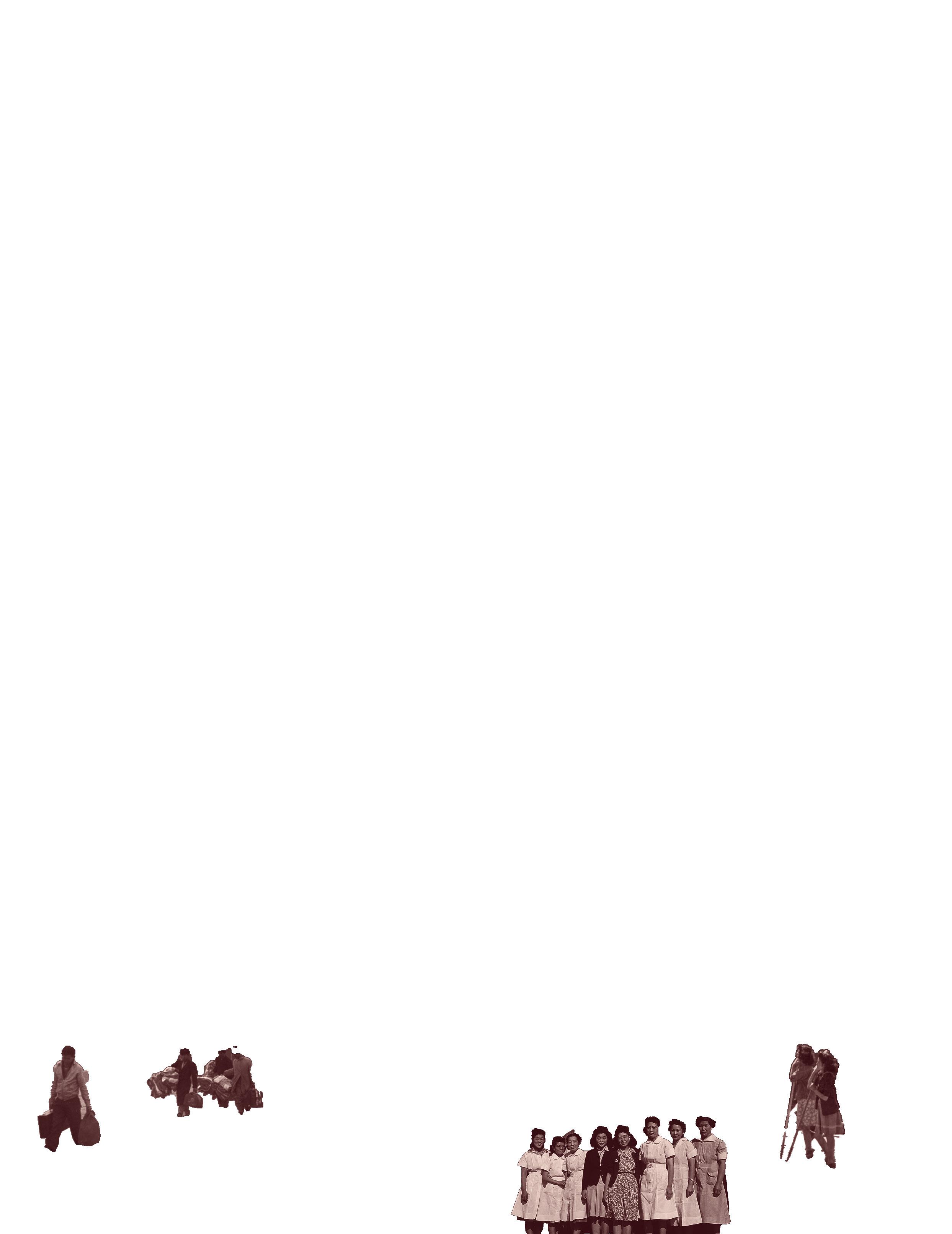
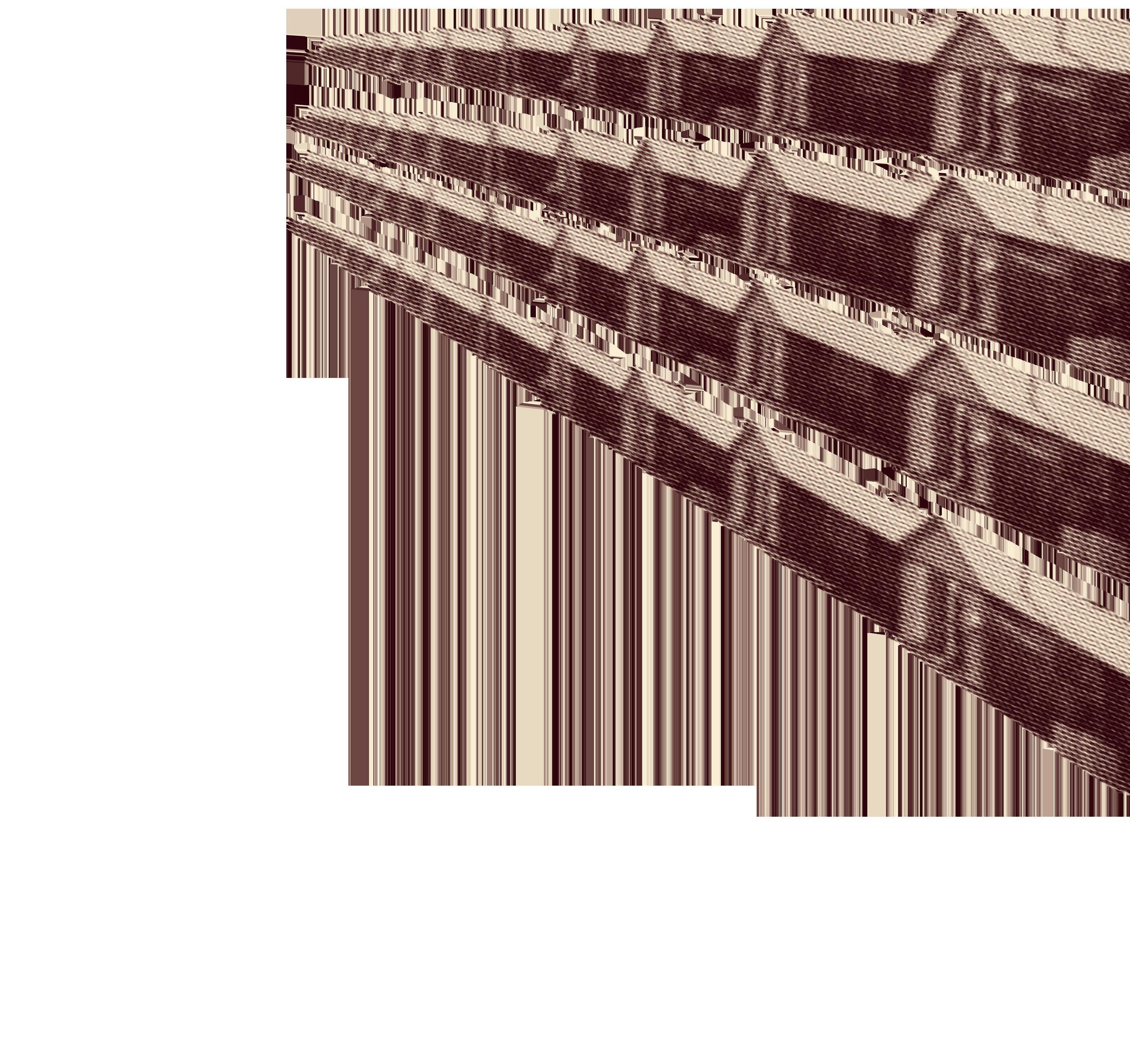
Facing a New World
by Samantha Chin
edited by Kiran Rudra
designed by Olivia Chang
As an Asian born and raised in the United States, I grew up with this idea that Asians hold minority status in society. Even living in New York, known as one of the world’s cultural melting pots, everyone around you can look drastically different depending on where in the city you go. I consider myself to be one of the luckiest people because I get exposure to such cultural diversity on a daily basis. In many ways, everyone being different and expressing it is part of the city’s culture itself. However, there was always some curiosity of what it would be like to live somewhere where everyone looked similar to me.
I would get to experience this firsthand as one summer, I had the opportunity to study abroad at Yonsei University in Seoul, South Korea. It was my first time going to an Asian country and also my first time traveling alone outside of my home country. Therefore, I was both nervous and excited. I was not sure what to expect. As soon as I got off the plane, I was immediately overwhelmed and acutely aware of the new world surrounding me. While I studied Korean for a few years at that point, nothing could really prepare me for walking among crowds of native speakers in their home country. This continued as I spent more time walking around Seoul. Everyone seemed to be in their own world but somehow coexisted in such a chaotic manner. For example, it was common to get bumped on the shoulder by people passing by but no one would take notice yet turn around to apologize. While it comes across as rude in the West when people do this, it is normalized in Seoul since the streets are always crowded and people are laser focused on getting where they need to go and completing their own goals. They have less regard for others who get in their way. It is the work and self-achieving oriented nature of life.
There is this air of independence that everyone carries with them, yet it still looks like each person is a gear the inner workings of a greater societal machine. I quickly had to learn this myself since I was on my own for most of my time in Korea. This reserved, focused, determined attitude also reminded me of the values that many Asian Americans carry from their immigrant parents and grandparents. Seeing it play out on the home continent on a societal scale makes one rethink how society would function back home if everyone held similar values.
To me, in some ways I felt at home. While I did not have the language skills or know all the cultural nuances of a native, I was in a big city. I would always tell myself, “You thrive in big cities. If you can survive in New York for two decades, how hard can Seoul be?”

I felt like most of my doubts were in my own head. And there were still mannerisms and cultural norms from my own Chinese family that I was familiar with. It was things as simple as taking off shoes indoors in places I visited and not having to raise my voice to be heard, unlike in America where people can be so loud in public and also in casual private conversation. These little things brought me joy in a country that was not my own. And this also made me contemplate how a lot of things I carry within me during my everyday life might not make sense to many Americans. But when I left home, a large part of me felt more culturally accepted. With that mindset, I was prepared to look forward and approach every day with optimism and curiosity.
I enjoyed every single day of the summer I spent in Korea. However, I’ll always be proud to be from a diverse place, living among diverse values and different ways of life. It’s how I never cease to keep learning and accepting how differences shape ourselves and the world around us. Living in a homogenous society like Korea, especially in Seoul, I noticed that the environment is reflective of the collective order that the cultural values establish. Most Asian households in America are familiar with the concept of hard work leading to efficiency and productivity. So in physical and social spaces, this was the norm everywhere I went. The public transportation was fast, reliable, and clean, the internet was also fast and reliable, and convenience stores were on every street corner in case one needed to buy a snack/quick meal or a one time use power bank if their phone died. That level of societal efficiency left me in awe. And yet, at the same time, I felt intimidated by it.
Seoul presents itself as a world class metropolis, on par with many major world cities. However, the homogeneity of Korean society and ideals can be very difficult for foreign visitors. Because while many things there appear to be straight out of a science fiction show, Korea is still very much ingrained in tradition. In many ways, their society is not accustomed to embracing change whether it be political, economic, or social. As an Asian-American, I was in a country full of people with features similar to mine for the first time in my life. And while I loved visiting Korea and still hope to return there and go to other parts of Asia someday, I knew that no matter what, I’d rather embrace my life as is.
As I reflect on this particular summer, I faced a new world that I only heard about through others or online. Being there was an entirely new experience that expanded my horizons and made me think about how I can love and appreciate whatever the future holds, even if it seems a bit scary at first. I can learn about parts of myself and find familiar comfort in unfamiliar environments. Change is meant to be faced. Challenges can come in many forms. But overall, the way we perceive the world is affected by what we encounter everyday and in turn affects how we choose to go through life.






photos by Ziyao (Jasmine) Zhang
Author’s Note:
A cento is a poem made up of lines from existing poems and written works. I wrote this cento last year for a creative writing class and revised it for publication. I would like to thank all of the poets featured here whose works express my intentions not perfectly, but well enough.
To be a good
Writer: Alyssa Gu Editor: Sogna Louie Designer: Miranda Liu
I wake up & it breaks my heart. I draw the blinds into a paper bag and label it EMERGENCY. The good news Flee from me, away from trouble. I don’t know how much longer I can stay.
Last night I had a dream of this messy world where, Life’s sharpest rapture is surcease of pain and all talking’s to oneself alone. I walk always in the direction of nothing, over the neon ocean. Sorrow is ever
Imagine being tamed. Learning to be still and look upwards, and then you have to pretend you are the lamp, and you are the night we’ve come to rely on.
I do not falter. Each day I live like this, Into years, that will never come again, a patient willing descent into the grass.
While there is still time Where the flowers — opened, closed — tell me of heirlooms hot from the sun, of purple angers and red shames; the yellow stripe of a joint and fragile keeping. Smell this yellow flower, so little, here with the ghost of a stain left as a token.

The sky is a blue gum streaked with rose. The trees are gentle as silence, covering the scars of my living. Spread it out maplike with the wind. There’s a chimney coughing replies that these are of course not regrets at all, if life means life means life means life.
This poor beleaguered universe never stops falling. I once pulled over my body’s car and let detach my body from my skin. Into marrow, into each succulent bud down to its broken-off stem, the soul shrinks, all smouldering from within.
So much of any year is flammable; there was so much I couldn’t contain. Tell me about your despair, yours, and I will tell you mine. Perhaps the great error is believing we’re alone –A knife cannot cut itself open.
In me nothing is extinguished or forgotten. I, too, will overcome this.
I hear the sound all through the air, and what I heard was my whole self chorus of a whispery blues. She has decided to live another day.

Poems Cited (in order of appearance)
Title: “When I Grow Up I Want to Be a List of Further Possibilities” by Chen Chen
“Meditations in an Emergency” by Cameron Awkward-Rich
“Celebrate Good Times” by Franny Choi
“This marriage” by Rumi
“The Month of May” by Wendy Cope
“Consorting with Angels” by Anne Sexton
“a word is a miracle” by Ntozake Shange
“In Exile” by Emma Lazarus
“all which isn’t singing is mere talking” by e.e. cummings
“Déjà Vu” by Ruth Stone
“List of Forgivenesses” by Wendy Xu
“In Favor of One’s Time” by Frank O’Hara
“In Retrospect” by Maya Angelou
“What Carries Us” by Emily Jungmin Yoon
“Full Moon” by Mary Ruefle
“The Truth Will Set You Free” by René Char
“Green Koan” by Rita Dove
“Storm” by Tina Chang
“Corps de Ballet” by W.S. Merwin
“The Wish to Be Generous” by Wendell Berry
“The Mower” by Philip Larkin
“Orchard of Unknowing” by Paul Tran
“Tomatoes” by Joy Sullivan
“The Plaid Dress” by Edna St. Vincent Millay
“To Hold” by Li-young Lee
“To Revolt Is to Insist on Joy” by Nur Turkmani
“Stained” by Molly Zhu
“Banal Sojourn” by Wallace Stevens
“Need” by Babette Deutsch
“Chinese New Year” by Justin Chin
“February & my love is in another state” by José Olivarez
“Syringa” by John Ashbery
“The Devil’s Wife” by Carol Ann Duffy
“Chances” by Sarah Clancy
“Passage” by Victoria Chang
“Glow” by Ada Limón
“Truth is I would like to escape myself” by Nour Al Ghraowi
“Essay on Craft” by Ocean Vuong
“Black Figs” by Yusef Komunyakaa
“Love Calls Us To the Things of This World” by Richard Wilbur
“Ode to Bunker Hill” by Timothy Liu
“Burning the Old Year” by Naomi Shihab Nye
“The Forms of Resistance” by Emily Berry
“Wild Geese” by Mary Oliver
“My God, It’s Full of Stars” by Tracy K. Smith
“Assay Only Glimpsable for an Instant” by Jane Hirshfield
“If You Forget Me” by Pablo Neruda
“scent of orange blossoms: haiku/senryu” by Teresa Mei Chuc
“There She Is” by Linda Gregg
“Variation on a Theme by Rilke” by Denise Levertov
“Insomnia and the Seven Steps to Grace” by Joy Harjo
I gently lay the matte shell of an ivory nail across a rubbery pillowcase of bubble wrap; It doesn’t cut deep enough.
I look towards you: the sun, the mirror, the falling sky –cage me into a panorama. This is who i am: skin dried into sand; lips teal with ooze; nostrils soaked with decay; ears sliced by a hundred shards; eyes empty and hollow.

In the oasis: a rusty cigarette stomped into the dusty poison, crackling, cut so thin the wind seeps through, into your dreams, across your primordial ink and minty river; Dawn, you devoured the sun, trapped into volcanic acid, sealed in your gluttony.
Lilac surrounds the lake of storms and sunshine, its walls padded with summer clouds stained with blood and bile; Deep into the well of fragile grief, past a fog of sugary stew, A propane campfire, smoky, alone amongst the tangy wilderness.
Mourning dove, flap your wings, over the shipwrecked battlefield, a final war cry of rock ‘n’ roll; Bone crashes against bone, Birds blossom from the bloodbath; Blood builds from the birdbath; Mourning dove, wail to the microphone three times and they will answer in stereo, The dove will sing about me, The dove will sing for you.
An 8 ball, falls into the grotesque socket, never sleeping, never breathing, as i dissolve into noumena, a black box, twisting under and across, by the riverbed, The painter imprisons my form into obscura, splits my bone and muscle, dimensions deducted, I slam against the wall of the glossy polaroid of your gaze.
Like the sunflower, i always Face the midnight sun.
LUCAS CHIANG
designed by sharon nahm edited by tina ni


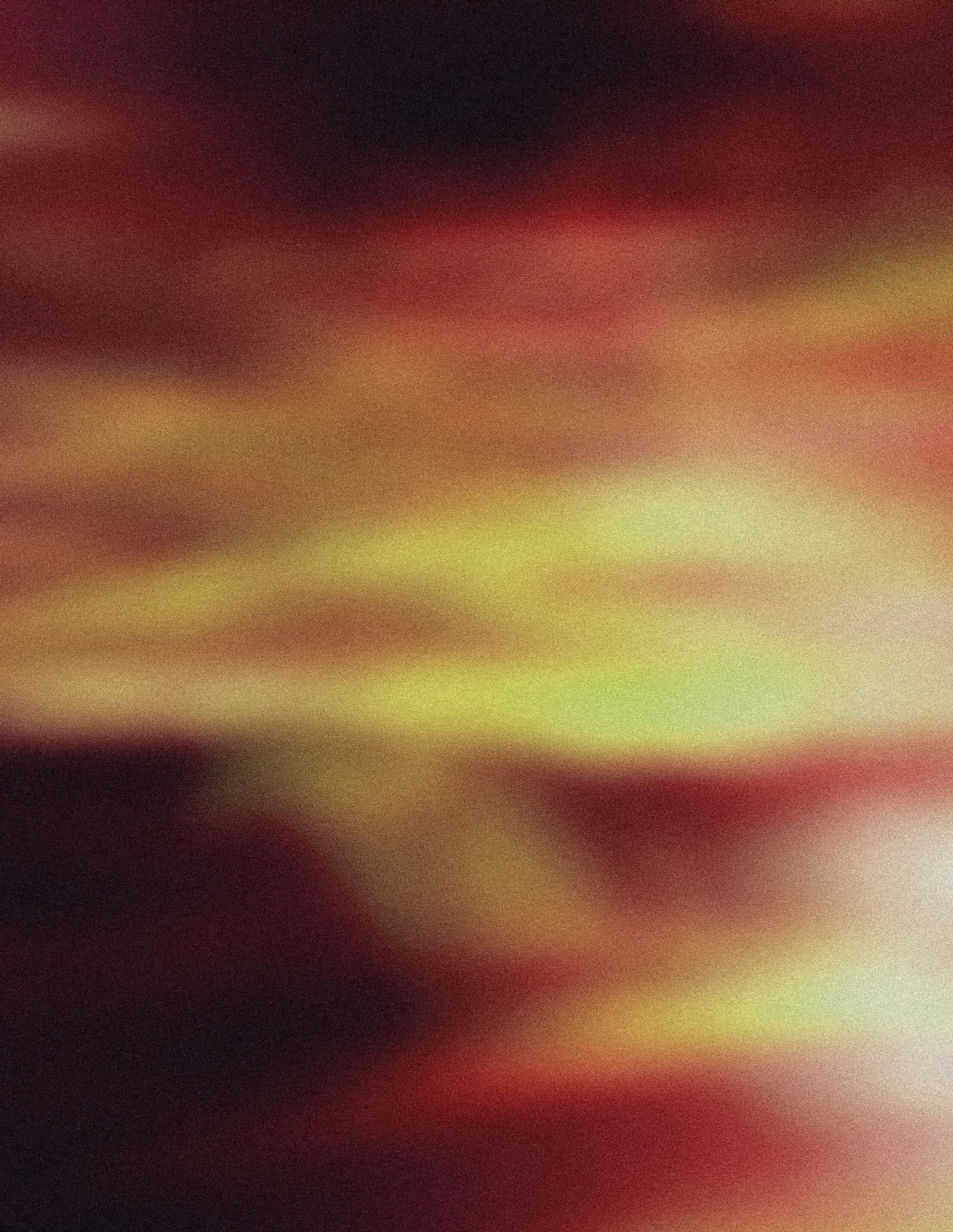



thank you for reading and creating.
PORTRAIT

issue #12 | face spring 2024
